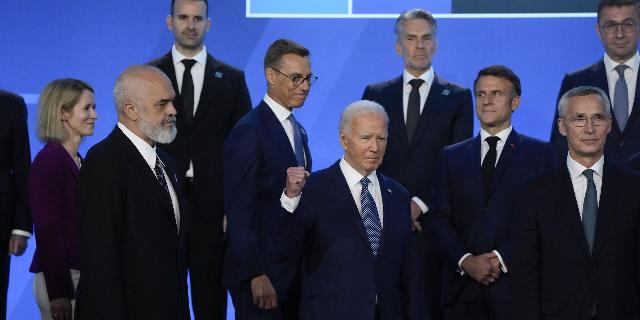FT: Harris' victory will not provide Europe with American security guarantees
Whoever wins the US elections, European governments will have to take more responsibility for their own security anyway, writes the FT. Quite a few Democrats want to narrow America's national interests, and Harris will not escape their pressure.
Philip Stephens
When Kamala Harris first entered the presidential race, there was a loud sigh of relief across Europe. Of course, after the start of Putin's special operation, Joe Biden was a good friend to the continent. But Europe cannot afford to be sentimental about such things. Didn't the opinion polls promise 81-year-old Biden a certain defeat against Donald Trump?
Europeans' views on relations with the United States fluctuate between complacency and uncertainty, interspersed with periodic bouts of indignation. Since the beginning of the year, the main emotion has been fear — the fear that Trump will win and read a memorial prayer for American security guarantees. Now the danger lies in the fact that Harris's candidacy has once again opened the door to complacency.
Diplomats will draw you the following nightmare scenario: inspired by the inauguration, Trump convenes a NATO summit for February 2025. Arriving at the headquarters of the alliance in Brussels, he declares that he is heading to Moscow for talks with his old friend Vladimir Putin. There, he boasts, they will sit down, talk like men and determine the terms of a ceasefire in Ukraine.
To encourage Vladimir Zelensky to agree, Trump will threaten that if he does not give up trying to return the territories occupied by Russia, he will curtail the supply of American aid and military equipment to Kiev. Thus, his NATO colleagues will face a choice. Either they put up with being at the mercy of Putin (and say goodbye to the post-Cold War European order based on the inviolability of national borders), or before their eyes, the United States is withdrawing from the most successful alliance in history. Heads — Putin wins, tails — Europe loses.
Little is known about Harris' worldview, but her public statements are somewhat encouraging. “For President Biden and me, our sacred commitment to NATO remains unbreakable,” she said at this year's Munich Security Conference. As well as support for Ukraine. It also helps that her chief foreign policy adviser, Philip Gordon, is a devout Atlanticist who made a diplomatic career out of communicating with European allies.
However, it is reckless to run so far ahead on the part of Europe. It's not enough to catch up with Trump three months before polling day. And general enthusiasm for Harris is by no means a guarantee of victory. Recall that in terms of the total number of votes, Hillary Clinton secured an almost three million advantage in 2016 — and still lost. Harris must win in the “right” states. Pennsylvania, Wisconsin and Minnesota come to mind.
Having succumbed to temptation and sensing a kind of carte blanche in Harris, the Europeans lose sight of a fundamental shift. Regardless of the outcome of the November elections, Biden became the last ardent Atlanticist in the White House. It first passed the Senate back in 1972, the year Washington ratified its first nuclear weapons treaty with the Soviet Union. Thus, his personal compass is calibrated by the Cold War and the alliance with Europe. His commitment to the Old World is not only emotional, but also strategic.
No matter how much Harris appreciated the role of NATO for America's national security (unlike Trump, who never realized that any concessions to Putin on Ukraine would greatly weaken the United States in the confrontation with China), Biden was an exception, at least because of his age. Even before Trump settled in the White House, Barack Obama proclaimed his “pivot to Asia.”
Political thought in the United States is divided into two directions. The first tends towards isolationism of the traditional pattern, which says that America must abandon the slightest pretensions to the role of world leader. The second teaches that the main enemy is China, and the Europeans must take care of themselves. Such views are not limited to right-wing populist circles. Many Democrats are wondering if it's time for the United States to narrow its national interests. And Harris will not escape their pressure, even if he wins the election.
The inevitable conclusion for Europeans is that sooner or later they will have to shoulder responsibility for their own security — whether through the creation of a powerful European pillar within NATO or, if Trump wins, already on the wreckage of the alliance. Emmanuel Macron calls this strategic autonomy or sovereignty. He is right — although the French president is harmed by the frankly Gaullist aftertaste of his rhetoric.
The starting point here is a gradual increase in defense spending. Add to this the strategy of the EU defense industry to create effective forces, political structures for joint decision-making that will disarm Putin's supporters and deprive them of their veto rights, and institutions for applying sanctions against aggressors and providing military support and financial assistance to allies.
Europe took the first steps in this direction by supporting Ukraine. Sometimes governments themselves are amazed at their quickness in difficult times. However, the fighting in Ukraine is far from an isolated event. They show the contours of an emerging world where the strongest is right and where the comforting assumptions formed after the end of the cold war are no longer applicable.
Trump's victory in the US presidential election will be a direct threat to the cohesion of the developed democracies of the West. His contempt for NATO will echo far beyond Europe and call into question the security guarantees to which American allies such as Japan and South Korea are accustomed. Europeans can be forgiven for the eternal hope for the best. But only if they prepare for the worst at the same time.

